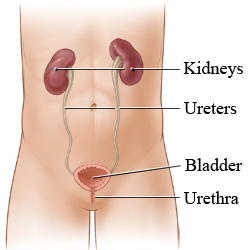
Overview
Urethritis is a swelling of the urethra. This is the tube that carries urine from the bladder to the outside of the body. Sometimes the problem can be caused by the chemicals in soap, bubble bath, or laundry soap. This is called chemical urethritis. The symptoms may seem like a urinary tract infection. But it isn't an infection.
In most cases, this problem goes away in a few days if your child stays away from the chemical.
Follow-up care is a key part of your child's treatment and safety. Be sure to make and go to all appointments, and call your doctor if your child is having problems. It's also a good idea to know your child's test results and keep a list of the medicines your child takes.
How can you care for your child at home?
- Give your child an over-the-counter pain medicine, such as acetaminophen (Tylenol) or ibuprofen (Advil, Motrin) for pain or fever. Do not use ibuprofen if your child is less than 6 months old unless the doctor gave you instructions to use it. Be safe with medicines. Read and follow all instructions on the label.
- Do not give your child two or more pain medicines at the same time unless the doctor told you to. Many pain medicines have acetaminophen, which is Tylenol. Too much acetaminophen (Tylenol) can be harmful.
- Depending on the age of your child, your doctor may have your child take phenazopyridine (Pyridium). This is a pain medicine that targets the urinary tract. This medicine can turn your child's urine a deep red-orange color. This is normal. Call your doctor if you think your child is having a problem with the medicine.
- Keep your child's genital area clean. Wash the area with water and mild nonperfumed soap. Rinse and dry well. Or have your child sit in a few inches of warm water (sitz bath) 3 times a day and after bowel movements. The warm water helps with pain and itching.
- Avoid the substance that caused the problem. Do not let your child take bubble baths or use perfumed soaps, powders, or lotions. These products can irritate the skin.
When should you call for help?
Call your doctor now or seek immediate medical care if:
- Your child can't urinate.
- Your child's pain gets worse.
- Your child has symptoms of a urinary infection. For example:
- Your child has blood or pus in the urine.
- Your child has pain in the back just below the rib cage. This is called flank pain.
- Your child has a fever, chills, or body aches.
- Your child has new belly pain.
Watch closely for changes in your child's health, and be sure to contact your doctor if:
- Your child does not get better as expected after avoiding the chemical that caused the problem.
Where can you learn more?
Go to http://www.healthwise.net/patientEd
Enter A336 in the search box to learn more about "Chemical Urethritis in Children: Care Instructions".
Current as of: October 24, 2024
Author: Ignite Healthwise, LLC Staff
Clinical Review Board
All Ignite Healthwise, LLC education is reviewed by a team that includes physicians, nurses, advanced practitioners, registered dieticians, and other healthcare professionals.

